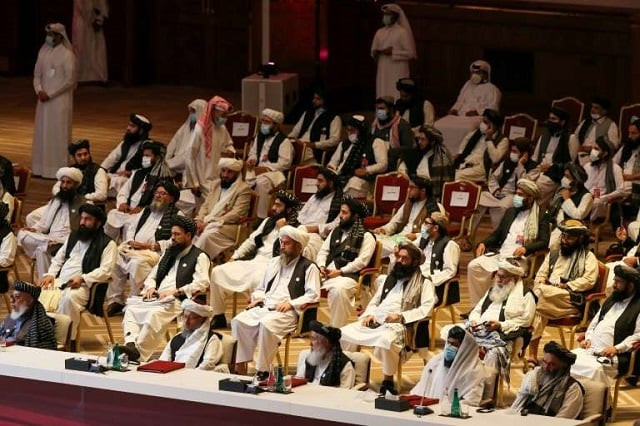Extended 'troika' in huddle with Afghan govt, Taliban to break deadlock
The extended “troika” had been meeting since 2019 to evolve a regional consensus on the Afghan endgame

Senior officials from the United States, Russia, China and Pakistan held talks with representatives of the Afghan government and Taliban in Doha in an attempt to break the deadlock in the intra-Afghan talks, as the US and NATO forces begin troop withdrawal from the war-torn country from Saturday (today).
The meeting of what is known as the extended “Troika” held in the Qatari capital on Friday amidst Taliban refusal to join the Istanbul conference after President Joe Biden extended the deadline of troops withdrawal.
The Pakistani delegation was headed by Ambassador Muhammad Sadiq while special envoys of the US, Russia and China represented their respective countries.
The extended “troika” had been meeting since 2019 to evolve a regional consensus on the Afghan endgame. Some of the meetings they held previously were never made public.
A joint statement issued after the meeting confirmed that extended “troika” met with representatives of the Afghan government and Taliban to discuss “ways to support intra-Afghan negotiations and help the parties reach a negotiated settlement and a permanent and comprehensive ceasefire.”
In a clear warning to the Taliban, the extended “troika” made it clear that there was no room for any group to take over Kabul by force. The joint statement said there was no military solution to the Afghan conflict and that the only way forward was to seek a political solution through the Afghan-led and Afghan-owned peace process.
Read more: As US prepared exit, Taliban protected foreign bases, but killed Afghans
“We do not support the establishment in Afghanistan of any government-imposed by force, consistent with the Joint Statement of the March 18 Expanded Troika,” according to the statement.
“We take note of the April 14 announcement by the United States and NATO that US/NATO forces will begin a responsible withdrawal from Afghanistan by May 1, 2021, that concludes by September 11, 2021,” said the joint statement.
“We reiterate that the withdrawal of foreign troops should ensure a steady transition of the situation in Afghanistan. We stress that, during the withdrawal period, the peace process should not be disrupted, no fights or turbulence shall occur in Afghanistan, and the safety of international troops should be ensured,” it added.
The four countries said they expected the Taliban to fulfil its counterterrorism commitments, including preventing terrorist groups and individuals from using Afghan soil to threaten the security of any other country; not hosting these groups and preventing them from recruiting, training, and fundraising. “We expect the Afghan government to continue counterterrorism cooperation with the international community,” the statement read.
The joint statement urged all parties to the conflict in Afghanistan to reduce the level of violence in the country and on the Taliban not to pursue a Spring offensive.
“We condemn in the strongest terms any attacks deliberately targeting civilians in Afghanistan and call on all parties to respect their obligations under international humanitarian law in all circumstances, including those related to the protection of civilians.”
“We reiterate that diplomatic personnel and property shall be inviolable, and the perpetrators of any attack or threat on foreign diplomatic personnel and properties in Kabul will be held accountable,” the statement warned.
The statement called on the Afghan government and the High Council for National Reconciliation to engage openly with their Taliban counterparts regarding a negotiated settlement.
The statement said they support a review of the status of designations of Taliban individuals and entities on the UN 1988 sanctions, as stated in the UNSC resolution 2513 (2020).
“Practical measures to reduce violence and sustained efforts to advance intra-Afghan negotiations by the Taliban will positively affect this review process.”
“We note the preparations by Turkey to host a conference of senior leaders of both Afghan parties in order to accelerate the intra-Afghan negotiations, and we also welcome the United Nations and Qatar’s roles as co-conveners of this dialogue. We call upon the negotiating parties to make progress toward an inclusive political settlement and a comprehensive and permanent ceasefire.”



















COMMENTS
Comments are moderated and generally will be posted if they are on-topic and not abusive.
For more information, please see our Comments FAQ